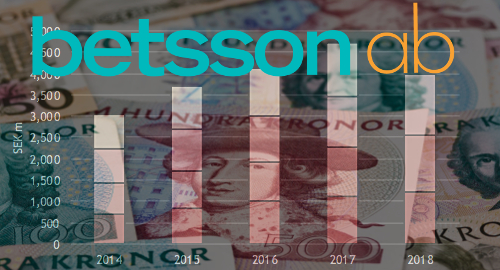 Swedish online gambling operator Betsson AB enjoyed the second half of the 2018 FIFA World Cup even more than the first, at least, in financial terms.
Swedish online gambling operator Betsson AB enjoyed the second half of the 2018 FIFA World Cup even more than the first, at least, in financial terms.
Figures released Wednesday show the Stockholm-based Betsson reporting revenue of SEK1.43b (US$156.8m) in the three months ending September 30, up 21% from the same period last year and a new company record. Earnings improved 49% to SEK424m while net income jumped 63% to SEK305m.
Sportsbook revenue improved 23% to SEK339m as turnover was up 14% and margins (after free bets) rose to 7.4%. The July portion of this summer’s World Cup football accounted for 1.8% of Betsson’s group revenue in Q3.
Casino revenue improved 22% to SEK1.06b, representing a full three-quarters of group revenue. Betsson’s ‘other products’ category reported revenue falling 37% to SEK21.6m.
Mobile channels were key to Betsson’s Q3 success, accounting for 67% of group revenue, 10 points higher than in Q3 2017, which the company attributed to product improvements. Mobile accounted for an even bigger slice of sportsbook revenue, rising 14 points to 78%.
Nordic markets remain Betsson’s bread-and-butter, producing revenue of SEK668.2m (+19%), with sports betting outperforming casino. That ratio was flipped in Western Europe markets, which rose 26% to SEK446.2m, largely on the strength of the casino vertical.
Central & Eastern Europe and Central Asia (CEECA) markets were up 8% to SEK241m while revenue from ‘locally taxed’ markets – where Betsson holds individual country licenses – rose 9% to SEK322.7m.
World Cup excitement helped drive registered customer ranks up 8% to 13.7m in Q3, while those customers’ deposits were up 18% to SEK4.85b. Active customers improved 11% to over 687k during the quarter.
Betsson was relatively quiet regarding the performance of its UK-facing NetPlay brand, which the company acquired in February 2017. The underperforming NetPlay business was previously blamed for an earnings shortfall in Q2 2018’s report card.
Betsson said Q4 has started off on a positive note, although the 6% rise in daily revenue through October 21 is more muted than Q3’s rise.
Betsson has been dealing with some senior personnel shifts in the past two months. In September, CFO Kaaren Hilsen gave notice that she was leaving early in the new year, while director Tristan Sjöberg submitted his resignation from Betsson’s board on October 11 after revealing that he was the subject of “a legal dispute with Swedish tax authorities regarding tax liability.”
Betsson endured a significant performance decline last year that led to the resignation of then-CEO Ulrik Bengtsson and an ‘efficiency’ drive that saw deep cuts to Betsson’s payroll. At the end of Q3, Betsson had 1,505 employees, down from 1,888 at the same point last year.
Betsson plans to use at least some of these cost savings on marketing, particularly when Sweden’s new regulated market launches in January 2019. Sweden is already a hotly contested advertising market and this month saw Betsson release a new Garbergs-designed campaign spanning TV, radio, online and outdoor channels.